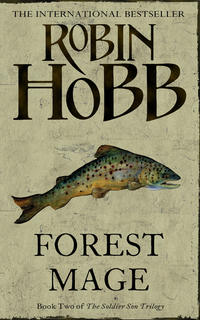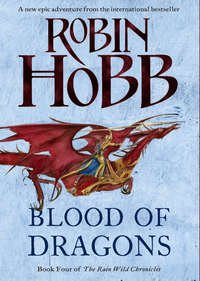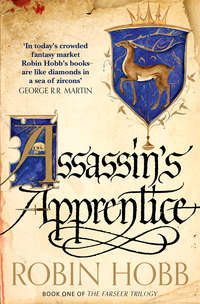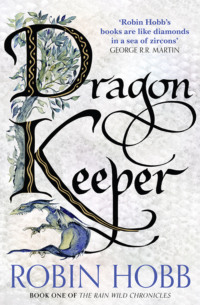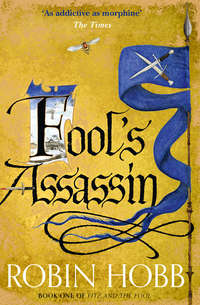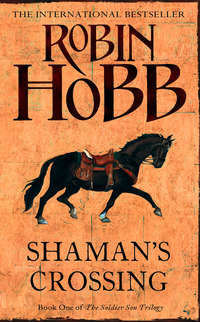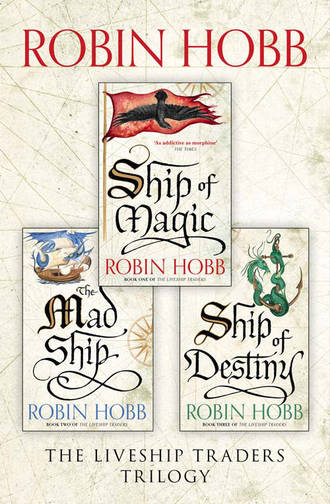
Полная версия
The Complete Liveship Traders Trilogy: Ship of Magic, The Mad Ship, Ship of Destiny
‘Why? You know what I look like.’
‘You’re impossible when you’re drunk.’
‘At least with me, it’s only when I’m drunk. You’re impossible all the time.’
Althea sounded distinctly annoyed now. ‘I don’t know why I’m even trying to talk to you.’
‘That makes two of us,’ Brashen added as an aside, as if to himself. The Paragon suddenly wondered if they were aware of how clearly he could hear their every word and movement. Did they know he was their unseen audience, or did they truly believe themselves alone? Brashen, at least, he suspected included him.
Althea sighed heavily. She leaned her head on the panelled door between them. ‘I have no one else to talk to. And I really need to… Look, can I come in? I hate talking through this door.’
‘The door isn’t latched,’ he told her grudgingly. He didn’t move from his hammock.
In the darkness, Althea pushed the door open. She stood in the entry uncertainly for a moment, then groped her way into the room. She followed the wall, bracing herself to keep from falling on the slanted deck. ‘Where are you?’
‘Over here. In a hammock. Best sit down before you fall.’
He offered her no more courtesy than that. Althea sat, bracing her feet against the slope of the floor and leaning back against a bulkhead. She took a deep breath. ‘Brashen, my whole life just fell apart in the last two days. I don’t know what to do.’
‘Go home,’ he suggested without sympathy. ‘You know that eventually you’ll have to. The longer you put it off, the harder it will be. So do it now.’
‘That’s easy to say, and hard to do. You should understand that. You never went home.’
Brashen gave a short, bitter laugh. ‘Didn’t I? I tried. They just threw me out again. Because I had waited too long. So. Now you know you are getting good advice. Go back home while you still can, while a bit of crawling and humble obedience will buy you a place to sleep and food on your plate. Wait too long, let the disgrace set in, let them get used to life without the family trouble-maker, and they won’t have you back, no matter how you plead and crawl.’
Althea was silent for a long time. Then, ‘That really happened to you?’
‘No. I’m making it all up,’ Brashen replied sourly.
‘I’m sorry,’ Althea said after a time. More resolutely she went on, ‘But I can’t go back. At least, not while Kyle’s in port. And even after he’s gone, if I do go back, it will only be to get my things.’
Brashen shifted in his hammock. ‘You mean your dresses and trinkets? Precious relics from your childhood? Your favourite pillow?’
‘And my jewellery. If I have to, I can always sell that.’
Brashen threw himself back in the hammock. ‘Why bother? You’ll find you can’t drag all that stuff around with you anyway. As for your jewellery, why not pretend you already got it, sold it piece by painful piece and the money is gone and now you really have to find out how to live your own life. That’ll save you time, and any heirloom stuff will at least remain with your family. If Kyle hasn’t seen to having it locked up already.’
The silence that followed Brash’s bitter suggestion was blacker than the starless darkness that Paragon stared into. When Althea did speak again, her voice was hard with determination.
‘I know you’re right. I need to do something, not wait around for something to happen. I need to find work. And the only work I know anything about is sailing. And it’s my only path to getting back on board Vivacia. But I won’t get hired dressed like this…’
Brashen gave a contemptuous snort. ‘Face it, Althea. You won’t get hired no matter how you are dressed. You’ve got too much stacked up against you. You’re a woman, you’re Ephron Vestrit’s daughter, and Kyle Haven won’t be too happy with anyone who hires you, either.’
‘Why should being Ephron Vestrit’s daughter be a mark against me?’ Althea’s voice was very small. ‘My father was a good man.’
‘True. That he was. A very good man.’ For a moment Brashen’s tone gentled. ‘But what you have to learn is that it isn’t easy to stop being a Trader’s daughter. Or son. The Bingtown Traders look like as solid an alliance you can imagine, from the outside. But you and I, we came from the inside, and the inside works against us. See, you’re a Vestrit. All right. So there are some families that trade with you and profit, and other families that compete with you, and other families that are allied with those who compete with you… no one is an enemy, exactly. But when you go looking for work, it’s going to be, well, like it was for me. Brashen Trell, eh, Kelf Trell’s son? Well, why don’t you work for your family, boy? Oh, had a falling out? Well, I don’t want to get on your father’s bad side by hiring you. Not that they ever come right out and say it, of course, they just look at you and put you off and say, “come back in four days”, only they aren’t in when you come back. And those that don’t get along with your family, well, they don’t want to hire you, either, ’cause they like seeing you down in the dirt.’ Brashen’s voice was winding down, getting deeper and softer and slower. He was talking himself to sleep, Paragon thought, as he often did. He’d probably forgotten that Althea was even there. Paragon was overly familiar with Brashen’s long litany of the wrongs and injustices suffered by him. He was even more familiar with Brashen’s caustic self-accusations of idiocy and worthlessness.
‘So how did you survive?’ Althea asked resentfully.
‘Went to where it didn’t matter what my name was. First boat I shipped out on was Chalcedean. They didn’t care who I was, long as I would work hard and cheap. Meanest set of rotten bastards I ever shipped with. No mercy for a kid, no, not them. Jumped ship in the first harbour we put into. Left that same day, on a different boat. Not much better, but a little. Then we… ’ Brashen’s voice trailed off. For a moment Paragon thought he had fallen asleep. He heard Althea shifting about, trying to find a comfortable way to sit on the slanted deck. ‘… by the time I came back to Bingtown, I was a seasoned hand. Oh, was I seasoned. But still the same old damn thing. Trell’s boy this, and Trell’s son that… I’d thought I’d made something of myself. I actually tried to go to my father and patch things up. But he was not much impressed with what I’d made of myself. No, sir, he was not. What a horse’s ass… so I went to every ship in the harbour. Every ship. No one was hiring Kelf Trell’s son. When I got to the Vivacia, I kept my scarf down low on my brow and kept my eyes on the deck. Asked for honest work for an honest sailor. And your father said he’d try me. Said he could use an honest man. Something about the way he said it… I was sure he hadn’t recognized me, and I was sure he’d turn me off if I told him my name. But I did anyway. I looked at him and I said, “I’m Brashen Trell. I used to be Kelf Trell’s son.” And he said, “That won’t make your watch one minute shorter or longer, sailor.” And you know. It never did.’
‘Chalcedeans don’t hire women,’ Althea said dully. Paragon wondered how much of Brashen’s tale she had truly heard.
‘Not as sailors,’ Brashen agreed. ‘They believe a woman aboard ship will draw serpents after you. Because women bleed, you know. Lots of sailors say that.’
‘That’s stupid,’ she exclaimed in disgust.
‘Yeah. Lots of sailors are stupid. Look at us.’ He laughed at his own jest, but she did not join him.
‘There are other women sailors in Bingtown. Someone will hire me.’
‘Maybe, but not to do what you expect,’ Brashen said harshly. ‘Yes, there are women sailors, but most of the ones you see on the docks are working on their family boats, with fathers and brothers to protect them. Ship out alone on anything else, and you’d better choose early which shipmates you want to roll. If you’re lucky, they’ll be possessive enough to keep the others off you. If you’re not lucky, they’ll turn a nice profit from your services before you reach the next port. And most mates and captains will turn a blind eye to what goes on, to keep order on the ship. That’s if they don’t claim your services for themselves.’ He paused, then added grumpily, ‘And you already knew all that. You couldn’t grow up around sailors and not know it. So why are you even considering this?’
Anger engulfed her. She wanted to shout that she didn’t believe it or demand to know why men had to be such pigs. But she did believe it, and she knew that Brashen could not answer that question anymore than she could. Silence bled into the darkness between them, and even her anger deserted her.
‘So what am I to do?’ she asked miserably. It did not seem to Paragon she was speaking to Brashen, but he answered anyway.
‘Find a way to be reborn as a boy. Preferably one that isn’t named Vestrit.’ Brashen rearranged himself in the hammock and drew in a long breath that emerged as a buzzing snore.
In her cramped corner, Althea sighed. She leaned her head back against the hard wood of the bulkhead and was still and silent.
The slaver was a darker silhouette against the night sky. If he felt he was in any danger of pursuit, he showed no signs of it. He had a respectable amount of canvas on but Kennit’s keen eyes saw no flurry of activity aloft to indicate he felt a need for extreme speed. The night was perfect, a sweet even wind breathing over the sea, the waves willing beasts bearing the ship along. ‘We’ll overhaul him before dawn,’ he observed quietly to Sorcor.
‘Aye,’ Sorcor breathed. His voice betrayed far more excitement at the prospect than his captain felt. Over his shoulder, he said quietly to the helmsman, ‘Keep her in close to the shore. Hug it like your granny. If their lookout chances to glance this way, I don’t want us visible against the open water.’ To the ship’s boy he hissed, ‘Below. Pass the word yet again. Still and silent, no movement that isn’t in response to a command. And not a light to show, not so much as a spark. Go and softly, now.’
‘He’s got a couple of serpents off his stern,’ Kennit observed.
‘They follow for the dead slaves thrown overboard,’ Sorcor said bitterly. ‘And for those too sick to be worth feeding. They go over the side, too.’
‘And if the serpents choose to turn and attack us during battle?’ Kennit inquired. ‘What then?’
‘They won’t,’ Sorcor assured him. ‘Serpents learn quickly. They’ll let us kill each other, well knowing they’ll get the dead with not a scale lost.’
‘And after?’
Sorcor grinned savagely. ‘If we win, they’ll be so fat with the crew of the slaver, they won’t be able to wiggle after us. If we lose…’ he shrugged. ‘It won’t much matter to us.’
Kennit leaned on the railing, sour and silent. Earlier in the day, they had spotted Ringsgold, a fine old fat waddling cog of a liveship, near as deep as he was tall. They had had the advantage of surprise; Kennit had had the crew hang out every bit of canvas the rigging would hold, and yet the liveship had lifted and dashed off as if driven by his own private wind. Sorcor had stood silent by his side as Kennit had first been silently incredulous and then savagely angry at the turn of events. When Ringsgold rounded Pointless Island to catch the favourable current there and be whisked from sight, Sorcor had dared to observe, ‘Dead wood has no chance against wizardwood. The very waves of the sea part for it.’
‘Be damned,’ Kennit had told him fiercely.
‘Quite likely, sir,’ Sorcor had replied unperturbed. He had probably already been sniffing the air for the spoor of a slaveship.
Or maybe it was just the man’s infernal luck that they had raised this one so quickly. It was a typical Chalcedean slaver, deep-hulled and wide-waisted, all the better to pack her full of flesh. Never had Kennit seen Sorcor so lustful in pursuit, so painstaking in his stalking. The very winds seemed to bless him, and it was actually well before dawn when Sorcor ordered the sweeps out. The ballistae were already wound and set, loaded with ball and chain to foul their prey’s rigging and grappling hooks were ready to snare their crippled conquest. These last were a new idea of Sorcor’s, one that Kennit regarded with scepticism.
‘Will you lead the crew to the prize, sir?’ Sorcor asked him even as the lookouts on the slaver sounded the first alarms.
‘Oh, I think I shall leave that honour to you,’ Kennit demurred dryly. He leaned idly on the railing, putting the pursuit and battle entirely into Sorcor’s hands. If the mate was dismayed by his captain’s lack of enthusiasm, he covered it well. He sprang aloft, to cry his commands down to the men on deck. The men shared his battle pitch, for they leaped to obey with a will, so that the extra canvas seemed to flow over the mast and blossom with the night wind. Kennit was selfishly grateful for the favourable wind, for it bore most of the stench of the slaver away from them.
He felt almost detached as they closed the distance on the slaver. In a desperate bid to outpace them, the slaver was putting on sail, the rigging swarming with men scuttling like disturbed ants. Sorcor cursed his delight with this and ordered the ballistae fired. Kennit thought he had acted too quickly, yet the two heavy balls linked with a stout length of barbed and bladed chain flew well and high, crashing into the other ship’s canvas and lines, ripping and tangling as they fell heavily to the deck below. Half a dozen men fell with the balls, screaming until they found the deck or vanished beneath the waves. The sound of their screams had scarcely died before Sorcor had launched a second set of balls and chain. This one did not do quite as much damage, but the harried crew of the slaver were now too busy watching for other missiles to work the sails effectively, while the canvas and lines that had fallen draped the deck and fouled the workings of the other sails. The slaver’s decks were in a state of total disarray when Sorcor ordered grappling-lines swung.
Kennit felt distant and detached as he watched their hapless victim roped in and secured. As dawn ventured over the water, Sorcor and his raiders leapt or swung across the small distance between the two vessels, whooping and screeching their bloodlust. Kennit himself lifted his cuff to his nose and breathed through his sleeve to keep from inhaling the stench of the slaver. He remained aboard the Marietta with a skeleton crew. Those who remained with him were plainly frustrated to be cheated of the slaughter, yet someone had to man the Marietta and be ready either to repel boarders or cast loose the grappling-lines if things went against them.
Kennit was a spectator to the slaughter of the slaver’s crew. They had little expected to be attacked by pirates. Their cargo was not usually to a pirate’s taste. Most pirates, like Kennit, preferred valuable, non-perishable goods, preferably easily transportable. The chained slaves below decks were the only cargo this ship carried. Even if the pirates had had the will to make the tedious voyage to Chalced to sell them, the transport of such cargo demanded a watchful eye and a strong stomach. Such livestock needed to be guarded as well as fed, watered and provided with rudimentary sanitation. The ship itself would have some value, Kennit supposed, though the current stench it gave off was enough to turn his stomach.
The crew of the slaver had such weapons as they carried to keep their cargo in order and little more than that. They did not, Kennit reflected, seem to have much idea of how to fight an armed and healthy man; he supposed that one became accustomed to beating or kicking men in chains and forgot what it was like to deal with any other type of opponent.
He had earlier tried to persuade Sorcor that the crew and vessel might have some ransom value, even if divested of their cargo. Sorcor had been adamantly opposed. ‘We kill the crew, free the cargo and sell the ship. But not back to other slavers,’ he had loftily stipulated.
Kennit was beginning to regret letting the man think he regarded him as an equal. He was becoming entirely too demanding, and seemed unaware of how odious Kennit found such behaviour. Kennit narrowed his eyes as he considered that the crew seemed overly pleased with Sorcor’s idealistic ranting. He doubted it was that they shared his lofty goals of suppressing slavery. More likely that they relished the thought of unreined carnage. As he watched two of his worthy seamen together loft a still-living man over the side and into the waiting maw of a serpent, Kennit nodded his head slowly to himself. This bestial bloodshed was what they craved. Perhaps he had been keeping too tight a rein on the men for the sake of the ransom that live captives bought. He tucked that thought away for later consideration. He could learn from anyone, even Sorcor. All dogs needed to be let off their leashes now and then. He mustn’t let the crew believe that only Sorcor could provide such treats.
He quickly wearied of watching the final slaughter. The slaver’s crew was no match for his. There was no organization to their ship’s defence, merely a band of men trying not to die. They failed at that. The mass of men that had met the pirate’s boarding party rapidly diminished to knots of defenders surrounded by implacable foe. The ending was predictable; there was no suspense at all to this conquest. Kennit turned away from it. There was a sameness to men dying that bored more than disgusted him. The shrieks, the blood that gushed or leaked, the final frantic struggles, the useless pleas; he had seen it all before. It was far more enlightening to watch the two serpents.
He wondered if they had not escorted this ship for some time; perhaps they even regarded it companionably, as a sort of provider of easy feeding. They had withdrawn when the Marietta initially attacked, seemingly upset by the flurry of activity. But when the sounds of battle and the shrieks of the dying began, they came swiftly back. They circled the locked ships like dogs begging at a table, vying with one another for the choicest positions. Never before had Kennit had the opportunity to observe a serpent for so long and at such close quarters. These two seemed fearless. The larger one was a scintillating crimson mottled with orange. When he reared his head and neck from the water and opened his maw, a ruff of barbs stood out around his throat and head like a lion’s mane. They were fleshy, waving appendages, reminding Kennit of the stinging arms on an anemone or jellyfish. He would have been much surprised to discover they were not tipped with some sort of paralysing poison. Certainly when the smaller turquoise worm vied with the larger one, he avoided the touch of the other’s ruff.
What the smaller serpent lacked in size it made up for in aggression. It dared to come much closer to the ship’s side, and when it lifted its head to the height of the slave-ship’s rail, it opened its maw as well, baring row upon row of pointed teeth. It hissed when it did so, sending forth a fine cloud of venomous spittle. The cloud engulfed two struggling men. Both of them immediately left off their own fight and fell gasping to the deck, writhing in a useless struggle to pull air into their lungs. They soon grew still while the frustrated serpent lashed the sea beside the ship into foam, furious that its prey remained safe aboard the ship. Kennit guessed that it was young and inexperienced. The larger serpent seemed more philosophical. He was content to hover alongside the slaver, watching expectantly for men bearing bodies to approach the railing. He then opened his maw to catch whatever was thrown, regardless of whether it was dead or wriggling. He would seize a body in his jaws, but made no effort at chewing it. His teeth seemed devoted to the purpose of tearing. These small titbits needed no dismembering. Instead the serpent would fling his head back and open his jaws far wider than Kennit would have believed possible. Then the body would vanish, boots and all, and Kennit could mark its progress down the creature’s gullet by the distension of his sinuous throat. It was a spectacle at once chilling and fascinating.
His crew seemed to share his awe, for as the battle subsided and there were but bodies and subdued captives to dispose of, they gathered their serpent victuals on the high afterdeck of the slaver and took turns feeding the serpents from there. Some of the bound captives wept and screamed, but their cries were drowned out by the approving roars of the pirate crew as each human morsel was flung over the side. It soon became a game to toss each victim or corpse not to a serpent, but between them, to watch the great beasts vie for the meat. Those men who had remained aboard the Marietta felt greatly slighted to be excluded from this pastime, for though they kept to their duties on the ship, it was with many a glance in the direction of their comrades. As the serpents became sated, their aggression diminished and they were content to take turns with their feeding.
As the final captives went over the side, the first of the slaves began to emerge onto the deck. They came up from the hatches, coughing and blinking in the morning light. They clutched their tattered rags about their bony bodies against the briskness of the sea wind. As hatch cover after hatch cover was removed, the fetid stink in the air increased, as if the stench were an evil genie confined too long belowdecks. Kennit’s gorge rose as he saw how scabrous these men were. Disease had always held a great horror for him, and he hastily sent a man to tell Sorcor it was time the vessels parted. He wanted good clean seawater between him and that pestilence-ridden hulk. He saw his messenger leap to his command, more than willing to get a closer look for himself. Kennit himself quit the afterdeck and went below to his cabin. There he set scented candles alight to ward off the trailing odour from outside.
Some moments later, Sorcor rapped smartly on his door.
‘Enter,’ Kennit invited him brusquely.
The burly mate came in, red of hand and bright of eye. ‘A complete victory,’ he told Kennit breathlessly. ‘A complete victory. The ship is ours, sir. And over three hundred and fifty men, women and children released from below her scurvy decks.’
‘Any other cargo worth speaking of?’ Kennit asked dryly when Sorcor paused for breath.
Sorcor grinned. ‘The captain seemed to have an eye for fine clothes, sir. But he was a portly man, and his taste in colours rather wild.’
‘Then perhaps you will find the dead man’s garments to your taste.’ The chill in Kennit’s tone stood Sorcor up straight. ‘If you have finished with your adventure, I suggest we put a small crew aboard her and sail our “prize” to port somewhere, seeing as how that wooden hulk is all we have to show for the night’s work. How many men lost or wounded?’
‘Two dead, sir, three cut up a bit.’ Sorcor sounded resentful of the question. Plainly he had been foolish enough to expect Kennit to share his exuberance.
‘I wonder how many more we shall lose to disease. The stench alone is enough to give a man the flux, let alone whatever other contagion they have bred in that tub.’
‘It’s scarcely the fault of the folk we have rescued if we do, sir,’ Sorcor pointed out stiffly.
‘I did not say it would be. I will put it down to our own foolishness. Now. We have the ship to show for our troubles, and perhaps it will sell for a bit, but only after we have rid it of its cargo and seen to its scrubbing out.’ He looked at Sorcor and smiled carefully as he phrased the question he had been looking forward to. ‘What do you propose to do with these wretches you have rescued? Where shall we put them off?’
‘We can’t simply put them off on the closest land, sir. It’d be murder. Half are sick, the others weak, and there are no tools or provisions of any kind we could leave them, save ship’s biscuit.’
‘Murder,’ Kennit cut in affably. ‘Ah, now there’s a foreign concept for you and I. Not that I’ve been tossing folk to sea serpents of late.’
‘They got what they deserved!’ Sorcor was beginning to look badgered. ‘And better than what they deserved, for what they got was quick!’ He smacked a meaty fist into his other palm and nearly glared.
Kennit heaved a tiny sigh. ‘Ah, Sorcor, I do not dispute that. I am merely trying to remind you that we are, you and I, pirates. Murderous villains who scour the Inside Passage for vessels to overcome, loot and plunder and ransom. We do this to make a profit for ourselves. We are not nursery maids for sickly slaves, half of whom are probably as deserving of their fates as were the crew that you fed to the serpents. Nor are we heroic saviours of the downtrodden. Pirates, Sorcor. We are pirates.’




